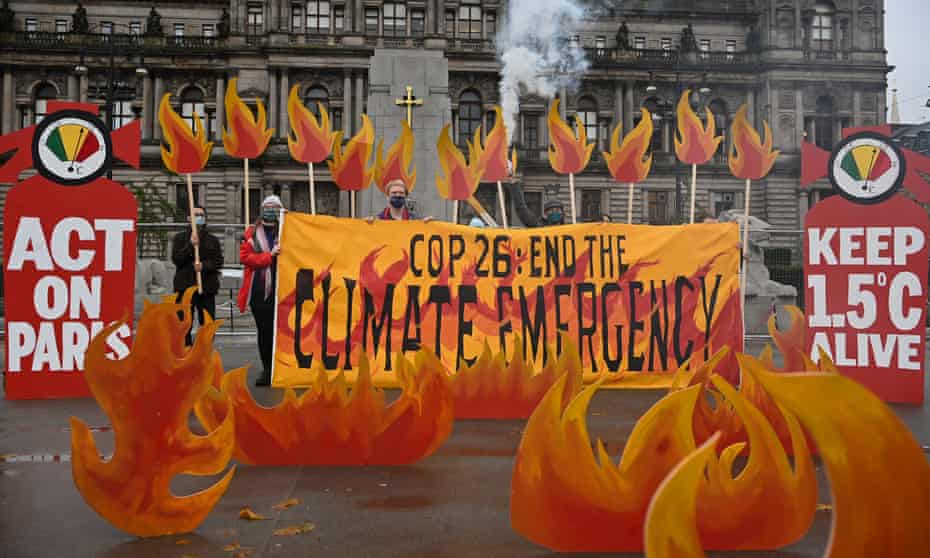Politicians talk about net zero – but not the sacrifices we must make to get there

Too few leaders will arrive at Cop26 bearing any mandate for serious climate action, because hardly any have tried to get one

To be facetious about it, they only have 12 days to save the Earth. As politicians and officials from 197 countries begin just under a fortnight’s work at the Cop26 summit in Glasgow, you can sense a strange mixture of feelings: expectation, cynicism, fatalism, anger and fragile hope.
It will be easy to lose track of what is at stake and who is who – although anyone feeling confused should recall the report issued in August by the Intergovernmental Panel on Climate Change and its bracing conclusion: that huge environmental changes triggered by global heating are now everywhere, and avoiding a future that will be completely catastrophic demands “immediate, rapid and large-scale reductions” in carbon emissions. The point is simple enough. But one familiar factor may well weaken the resolve of the key people at Cop26: the fact that too few politicians will arrive in Scotland bearing any mandate for serious climate action, because almost none of them have tried to get one.
Two crucial political problems define the contrast between what is required and what those in power have so far chosen to deliver. One centres on the populism and power cults that actively get in the way of climate action – something evident in both the records of strongmen like Donald Trump, Vladimir Putin, Brazil’s Jair Bolsonaro and Turkey’s Recep Erdogan, and where our ecological emergency sits in the cultural and generational conflicts that are now bubbling up all over the world.
In the UK, the latest manifestation of the populist right’s belligerent scepticism is the suggestion that we might rerun the Brexit referendum in the form of a vote on whether or not to pursue the goal of net zero carbon emissions. You also see it in those seemingly daily video clips of some or other sub-Alan Partridge TV or radio host arguing with someone from Extinction Rebellion or Insulate Britain, a ritual which feels like a new national sport.
The other impediment to action is more insidious. On both the centre-left and centre-right, there is superficial recognition of the hard yards required to do something about the climate emergency but, so far, an aversion to thinking about the huge changes to everyday life that will be necessary. “We can build back greener without so much as a hair shirt in sight,” says Boris Johnson.
Keir Starmer may not have uttered anything so crass, but he too seems to believe in a modest utopia of a new green economy, insulated homes, increased funding for science, and the day somehow being saved by British derring-do. “Climate change is about jobs,” he insists, which is partly true. But, like Johnson, he doesn’t mention revolutionising what we eat and why and how we travel, or – God forbid – the continuing fetishisation of economic growth.
Might that be an inevitable feature of democracy? Perhaps. But in the UK, the first focus of blame should be the two-party Westminster model of politics kept in business by our stupid electoral system, and the way that it sustains political philosophies that ought to have been left behind in the 20th century.
On the right, notwithstanding Johnson’s swerve into the politics of big spending and economic interventionism, Toryism remains beholden to the market, and dead against the idea of the common good shaping the lifestyles of anyone who is halfway affluent (the poor, of course, are fair game). Its contorted priorities are illustrated by the fact that the government’s current leading lights managed to take us out of the European Union at a huge cost to national income and the country’s economic future. But they cannot muster anything like the same enthusiasm for risking some stability and prosperity in the interests of saving the planet.
And Labour? Here is a radical thought: given his beleaguered position and the urgency of the crisis, Starmer could conceivably go for broke, and predicate his leadership on the climate emergency, finally bringing its scale and urgency somewhere close to the heart of politics. The thought, unfortunately, would not even occur, because of what the Labour party is. Its origins lie in a world of coalmines and smokestacks. Like its sister social-democratic parties in Europe, whatever reinventions Labour has undergone since, it has a deep, sentimental attachment to an idea of the good life centred on work and the factory, and raising people’s living standards so that they can consume with the same enthusiasm as everyone else. At the most basic level, it shares the Tory idea that growth is the sine qua non of economic policy.
During the Corbyn years, some of this stuff was undoubtedly shaken up, although there were also signs of a conservatism that still runs across all wings of the party. In 2015, as he ran for the leadership, Jeremy Corbyn endorsed reopening mines in south Wales. Four years later, as Labour decisively embraced a so-called Green New Deal in preparation for the 2019 election, some of the big unions – who represent gas, oil, and aviation workers – insisted on 2030 being a target for “significant progress” rather than a non-negotiable net zero deadline.
It is worth remembering the view of the then leader of the GMB union, Tim Roache: the latter stance, he raged, would mean “within a decade people’s petrol cars being confiscated. This will mean families can only take one flight every five years. Net zero carbon emissions by 2030 is utterly unachievable.”
So, which way out? As a means of at least trying to reorientate our politics, a lot more people are going to have to vote for the Green party – and, to maintain the sense of last-ditch urgency that Extinction Rebellion have brought to things, the case for what some people call extra-parliamentary activity feels beyond argument. Without wanting to sound overly pessimistic, the most likely outcome of all the negotiations and diplomatic theatre in Glasgow will push even more people in that direction, and their protests will bring on the usual sneers and priggishness, not least from Westminster politicians. But as ever, the people involved will have a simple answer: that if politics endlessly fails, the streets may be all you have left.
-
John Harris is a Guardian columnist
